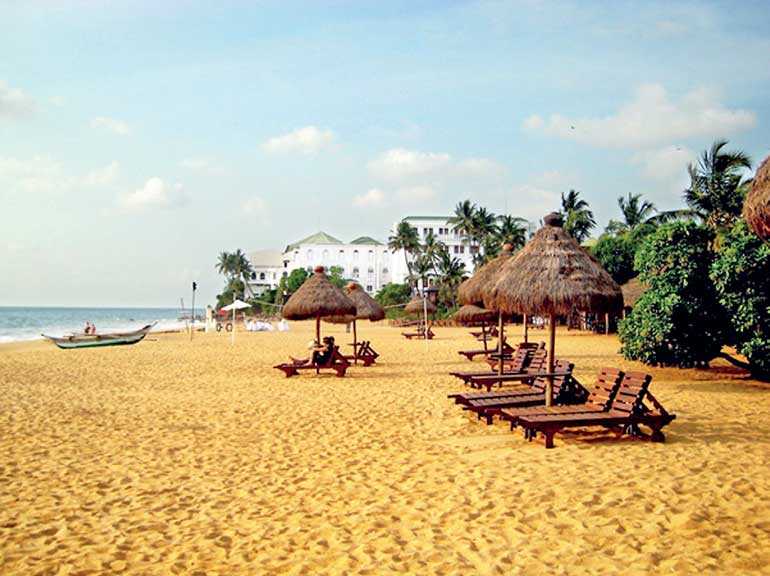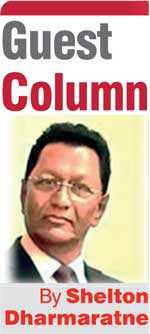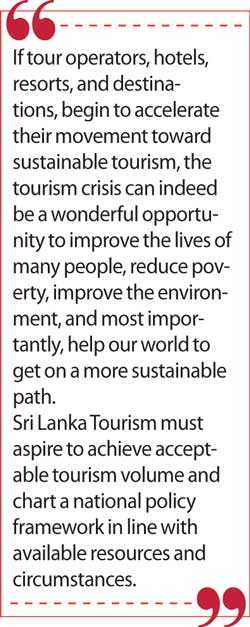Sunday Jan 25, 2026
Sunday Jan 25, 2026
Tuesday, 14 May 2019 00:00 - - {{hitsCtrl.values.hits}}

Terrorist attacks are potentially devastating for tourist destinations. Most crises cannot be predicted and many cannot be avoided, meaning that no destination is immune from them. In light of societal and global complexities, no destination is immune to negative occurrences, thus adhering to an “it can’t happen to us” philosophy can only be described as naive, if not reckless. Possibly the next level of terrorism could be cyber terror which we have no clue about but the terrorists are very savvy. The struggle continues.
Terrorism that targets tourism (luxury hotels in Colombo of international repute) can be viewed as a disaster for a destination and ensuing events can create a serious tourism crisis.
While a natural disaster can impede the flow of tourism, terrorism risk tends to intimidate the traveling public more severely – as demonstrated by the realignment of travel flows and cancellation of vacations during periods of heightened terrorist activity.
Sadly, there have been many terrorist attacks, such as 9/11, the Bali bombings Terror by Truck in Nice and the attacks in London on 7/7, but nonetheless cause significant and long lasting issues. After the 9/11 attacks on New York it took New York hotels 34 months to recover from the attacks.
On 13 November 2015, a coordinated terrorist attack in Paris killed 130 people and injured around 352 others, according to the NATO Review Magazine (NATO: 2015). The Brussels attack happened on 22 March of 2016. 32 people were killed and 340 injured.
Costs incurred due to terrorist attacks are very difficult to calculate especially when it comes to the indirect costs. Following the attacks in Boston it was estimated that the total costs of the attack were around $ 438 million, out of which approximately $ 31 million covered the damage of property, medicinal costs and the cities lock down (World Economic Forum: 2015).
Another example is Brussels which spent around $ 57.9 million a day to keep the city on lock down following the Paris attacks (World Economic Forum: 2015). Implementing a lockdown is most likely the first measure of recovery trying to regain the sense of security among the cities’ inhabitants and tourists in order to regain a peaceful environment.
After the terrorist attacks from 2015 in Paris, it has been shown that the tourist rate decreased by 20% in the French hotels.
On average, it takes approximately 13 months for a place to recover from a terrorist attack, according to research from the WTTC (2015). Reflecting on this statement it is clear that tourists will most likely not stop traveling, however they will most likely change destinations to a more secure location. Travellers are risk averse and do not wish to spend their vacation feeling anxious about their personal safety, mindful of their belongings, and wary of being ripped off. According to a survey by ‘Travelzoo’, 40% of UK travellers rate security as the most important variable when choosing their holiday destination.
Paris is unique; therefore not interchangeable and has a solid image going far beyond its tangible attractiveness leading most likely to a shorter recovery period after a crisis due to its outstanding image.
However, one can not only rely on its uniqueness and image for a short recovery period. According to the World Economic Forum there is a need for security protocols, which enable destinations and countries to recover in a faster manner provided the protocols are well created and implemented correctly.
One of the major factors in implementing the above is to start the security protocol as soon as possible instead of letting time pass. Crisis protocols, recovery strategies, strong emergency plans are indispensable for nations to recover faster. In order to resolve all issues or the majority of the issues following a terrorist attack, partnering with other nations is a key factor in such an emergency situation (World Economic Forum: 2015).
A number of strategies can be taken in order to recover from a decline in demand, ensuring that the number of tourists visits return to normality: normality being reaching similar demand as before the crisis occurred.
Focuses less on the development but more on the implementation that needs to be in place in order for a strategy to be effective relevant stakeholders need to be involved in the creation of a recovery strategy in order for it to be effective. Destinations can manage the perceptions of visitors through implementing a strong communication plan that provides accurate, relevant and timely information to visitors.
Tourism is susceptible to all types of disaster risk ranging from natural disasters, pandemic, terrorism, war, and civil unrest. Equally tourism is inherently resilient, especially with individual travellers, who make their own decisions based on risk appetite and knowledge of their destination.

Peace and security are preconditions
Sri Lanka as a developing country with ambitions to build a successful tourist industry needs to tackle internal instability and provide a safe environment for potential visitors. Tourism is not only about economic aspects, but also social, psychological and cultural. Subjects involved in tourism (such as entrepreneurs, agencies, state organisations, public administration, non-profit organisations, etc.) tend to perceive tourism purely from the economic (profit maximisation) or management (destination management issues) perspectives. Very often they neglect social aspects of tourism.
The tourism industry is monopolised by private sector companies; whose role is focused on marketing and maintenance of tourist facilities whilst the public sector focuses on managing the tourism environment, issuing policy guidelines and protecting the nation’s image.
The politics of tourism
The Government has a role to play in tourism planning which is not limited to economic development and poverty reduction but includes building the nation’s image and identity.
Dr. Dushni Weerakoon (Head of Macroeconomic Policy research at the IPS) emphasises the fact that Sri Lanka had withstood more than three decades of terror prior to May 2009 and an economy that had shown resilient growth averaging 5% per annum in that period; Sri Lanka is certainly not a novice in managing the expected economic fallout. A swift and efficient response to bring the security situation under immediate control and restore ‘normalcy’ helps establish the former; confusion and disarray only reinforce the latter and delays an economic recovery.
Heightened volatility in the global economy and intensifying geopolitical rivalries pose complex policy challenges for small countries embarking on post-conflict development. These issues are nowhere better exemplified as in the case of Sri Lanka. The aftermath of the conflict was ripe with opportunities, but also posed daunting challenges.
Despite the rapid increase in international tourism numbers various concerns have been raised that government policies are likely to advantage large tourism operators and developers at the expense of small businesses in the informal sector. The development of the industry may also be at the expense of livelihoods of poorer members of society in other industries. A concentration on large-scale developments may reduce the resilience and therefore sustainability of the industry.
Writing to Sunday Times Dr. Nimal Sanderatne describes “that the cumulative impact of the current terrorism would be to destabilise the economy and slow economic growth. The terrorist attacks would impact adversely, inter alia, on the balance of payments, external financial position and fiscal outcome. The nation’s increased external vulnerability would be the most serious consequence. Tourist arrivals were expected to exceed 2.5 million and earn $ 5 billion this year. The current expectation is that tourist earnings will dip below $ 3 billion. This $ 2 billion fall is a massive loss.
Dr. Nimal Sanderatne, Sri Lankan economist of repute argues that this year’s bumper harvest, if followed by a good Yala harvest would ensure that the country is more than self-sufficient in rice and, therefore, not require to import rice, as well as reduce wheat imports that are a close substitute. Export manufactures that are not affected should attempt to increase their exports. The unaffected economic activities should redouble their efforts to support the economy.
Does tourist expenditure really filter through to benefit the local economy? We need an economy in which markets serve society, not the other way round. The economy needs to be hard-wired for economic justice, rather than hoping the benefits of economic growth will trickle down to the population at large. This will require several shifts. The financial sector will need to move from focusing on short-term profits to long-term investment.
Tourism is a huge, intensely competitive industry, which has acute social consequences. It is a complicated economic, social and political subject and is not detachable from its complex contextual environment.
If tour operators, hotels, resorts, and destinations, begin to accelerate their movement toward sustainable tourism, the tourism crisis can indeed be a wonderful opportunity to improve the lives of many people, reduce poverty, improve the environment, and most importantly, help our world to get on a more sustainable path.
Tourism is a highly political phenomenon, the implications of which have been only rarely perceived and almost nowhere fully understood.
Sustainable development and preservation of environments requires effective planning, policies and control. In other words, tourism development has to be planned and managed. Through proper and effective policies and planning, tourism could be developed as an effective development agent.
Government’s roles and responsibility in tourism development
Why is such tourism policy necessary? And who should formulate tourism policy? There are important social, cultural, environmental and economic implications stemming from its development. For this reason, it is necessary to manage the growth of the tourism sector and to have clear guidelines to ensure that growth is compatible with national and sectorial objectives. A tourism policy must provide the required guidelines and the reference point against which any future development in the sector should be evaluated.
Who should be the planner?
There are various alternatives. As Dieke, Associate Professor of Tourism University of Strathclyde UK put it, ranging from the private business sector to public administrator or a combination of the two. Free-market liberalism and capitalism have given way to a market driven mode of development because of Government’s lacking of the market-based understanding or flexibility to react to market signals.
What is development? Development for whom and why? Tourism and Public Policy – it is imperative to undertake tourism public policy studies in order to understand the causes and consequences of public policy decisions and actions; political nature of the tourism policy –making process, and public participation in the tourism planning, intended and unintended consequences of tourism policies in terms of their impact on host communities and on the political system. Research is beginning to demonstrate that such ad hoc measures, especially when it comes to marketing, may be ineffective and in some cases do more damage than good.
If the first signs of trouble are perceived, it is easy to find the solutions but if one let trouble develop the medicine will be too late because the malady will have become incurable.
‘… if one recognises political problems early (which only a shrewd and far-seeing man can do), they may be resolved quickly, but if they are not recognised, and are left to develop so as everyone recognises them, there is no longer any remedy….”: The Prince, by Nicolo Machiavelli.
What is tourism public policy? Tourism industry is diverse, fragmented and dynamic. And it can be studied at number of levels and from many perspectives. Tourism-led development should always conform to the long-term interests of the popular majority instead of the short-term goals of an elite minority.
Tourism attractions are fragile and need to be carefully managed so that they are not allowed to exceed their capacity limits. After all, who wants to stay at a resort that feels overcrowded and over-commercialised? As Richard W. Butler points out, tourism destinations carry with them the seeds of their own destruction.
It is therefore that there is a need for a more coherent, logical and up-to-date approach to tourism, both at personal and national level. Its role in the country needs to be more clearly identified so that the benefits of tourism can be encouraged and the pitfalls anticipated and circumvented. The consequences of continued growth must be analysed, and if found to be unfavourable, then attitudes must change.
Does tourist expenditure really filter through to benefit the local economy; or has the emergence of international airlines, international hotel companies, international travel agents and international banks meant that the benefits of tourist expenditure are now being siphoned away and reverting to the tourist’s country of origin rather than his destination? Is it the case that the taxpayer of the tourist destination is in fact subsidising the tourist without receiving adequate benefit?
Is it in the best interests of a developing country like Sri Lanka to graduate from an agricultural economy to a service economy based on tourism without the immediate stage of a manufacturing economy? The danger appears to be at the next stage economic development. Where unemployment and underemployment have been reduced, the labour force is better educated and an infrastructure exists which might support other industries. Continuing dependence and emphasis on tourism may no longer be economically justifiable.
The time has now come for Sri Lanka Tourism to take the ‘Goddess of Tourism’ off her pedestal and place her to the garden with all other statutes. For too long governments have assumed unquestionably the benefits from tourism and have encouraged it to expand. The undesirable consequences have been swept under the carpet.
Sri Lanka Tourism must aspire to achieve acceptable tourism volume and chart a national policy framework in line with available resources and circumstances. Think big and go big is simply a political wish and is the plan of the bureaucracy sans a fundamental policy framework. Sri Lanka Tourism has an urgent need for public policy studies – the focal point of Government activity, in order to comprehend the causes and consequences of policies decisions and actions, which should be of interest to economists, sociologists and environmentalists as well as hospitality industry professionals.